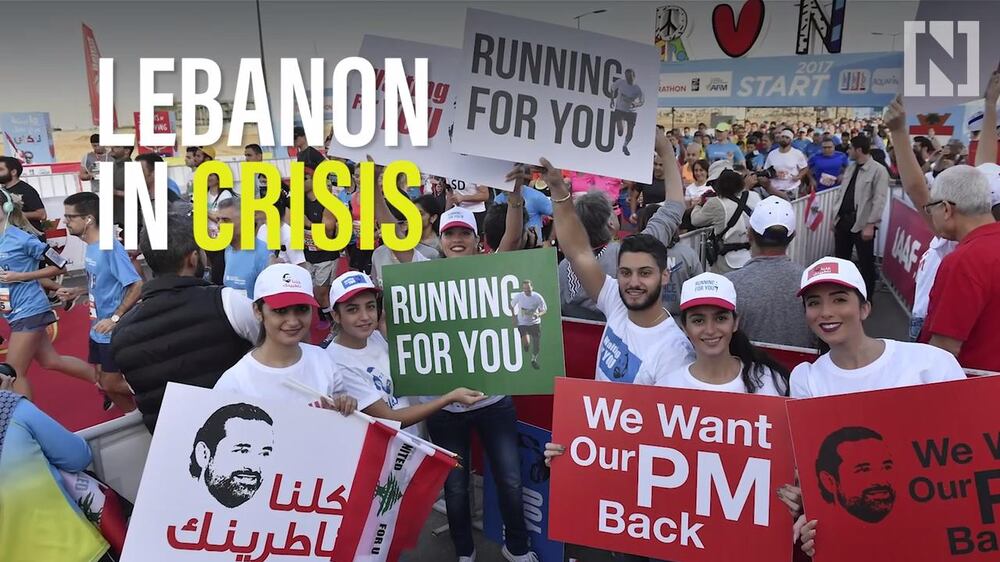In a 90-minute interview, Saad Hariri — until recently the prime minister of Lebanon — vowed a return to Beirut "within days".
Mr Hariri travelled to Saudi Arabia and announced his resignation in a televised speech on November 4.
While appearing tired, his voice choking as he addressed his supporters in Lebanon, Mr Hariri gave an insight into the road ahead. He hinted four times at the possibility of dialogue and a "broader settlement" with Hizbollah that could secure Lebanon's interests and avoid economic sanctions on the country.
The interview was broadcast live from Mr Hariri's house in Riyadh. Lebanon's Future TV anchor Paula Yacoubian delved into political and personal questions ranging from Saudi Arabia's relations with Iran to Mr Hariri's stay in the kingdom, the conditions of his sojourn in Riyadh and even his smart watch and his use of WhatsApp messages.
To emphasise that the interview was being aired live, Ms Yacoubian referred repeatedly to events that happened at the time, such as the earthquake in Iraq and reaction in Lebanon to interview itself.
The former prime minister denied rumours that he was under house arrest, or that his resignation was related to Riyadh's arrest of 11 princes and former officials on the same day. “I’m free in the kingdom and I can travel anytime I want,” Mr Hariri said.
______________
Read more
Hariri supporters stress 'brotherly relations' between Lebanon and Saudi Arabia
Lebanon crisis: No sign of Hariri, Saudi citizen kidnapped
Iran and Hizbollah are plunging Lebanon into a fresh crisis
______________
"The anti-corruption campaign is an internal Saudi issue. I wish we can do same in Lebanon," he said. The suggestion of a connection between the campaign and his resignation was "a work of fantasy, ".
Throughout the conversation, Mr Hariri pledged he would return to Lebanon "within days." He described his resignation as a "positive shock" to the system and a wake-up call to Lebanon, which could be hit by a wave of economic sanctions if it and Hizbollah do not disassociate themselves from regional conflicts. If they do not, there was a risk of escalating economic measures from Gulf countries, such as halting trade with Lebanon or deporting the hundreds of thousands of Lebanese who work in Saudi Arabia.
“I'm not against Hizbollah as a political party, but that does not mean allowing Hizbollah to ruin Lebanon,” he said.
It was those reasons, as well as concern for his nation's security, that led to his resignation, he said, “to protect the interests of Lebanon”. He used Hizbollah’s involvement in Yemen as an example. “Saudi Arabia loves Beirut but it won’t love it more than Riyadh. Will it continue to love Beirut when a Lebanese group tries to undermine the stability of the Gulf?” he asked.
Mr Hariri also said that his resignation “could be reversed” if dialogue in Lebanon could attain a commitment from Hizbollah to disassociate itself. “That would be enough,” he said.
The way to such a reversal, he suggested, would begin with his return to Lebanon, submitting his resignation to president Michel Aoun, initiating dialogue and either reaching a political settlement that would lead to a new government or waiting until the parliamentary elections scheduled for May.
“I will return to Lebanon. We have to keep working, we have to roll up our sleeves but we need a real final settlement with Hizbollah to shield Lebanon from regional crisis,” he said.
Asked about his stay in Saudi Arabia, Mr Hariri denied he was under house arrest or that his phone had been confiscated, but said he has been involved in “some self introspection" and holding lots of meetings. "Some you have seen with ambassadors and some are unannounced."
Throughout the interview, Mr Hariri was very complimentary about Mr Aoun, his new ally since they formed the government last December. Mr Aoun “respects the constitution” and their relationship "is built on honesty, we agree on a lot and we will have a dialogue when I return”.
Asked about his relations with the United Arab Emirates and last week's visit with Mohammed bin Zayed, Crown Prince of Abu Dhabi and Deputy Supreme Commander of the Armed Forces, Mr Hariri described their meeting as "very good and special. I went to explain my position.”
On Iran, Mr Hariri said: “It’s not a hobby of ours to disagree with Iran, but we are not part of an axis.” Any Saudi-Iranian dialogue would have to present all the issues and problems, he said.
Mr Hariri reserved his harshest criticism for the Syrian government and he said he rejected any engagement between Lebanon and the government of Bashar Al Assad. His team is working on new security arrangements before his return to Lebanon, he said. “The Syrian does not want me alive and a lot of parties do not want Saad Hariri.”
When asked about the broad scope of his support across Lebanon, Mr Hariri could not contain his emotions. His voice breaking, he replied, "I thank every Lebanese who called for my return regardless of the party they belong to. I will be back very soon."






